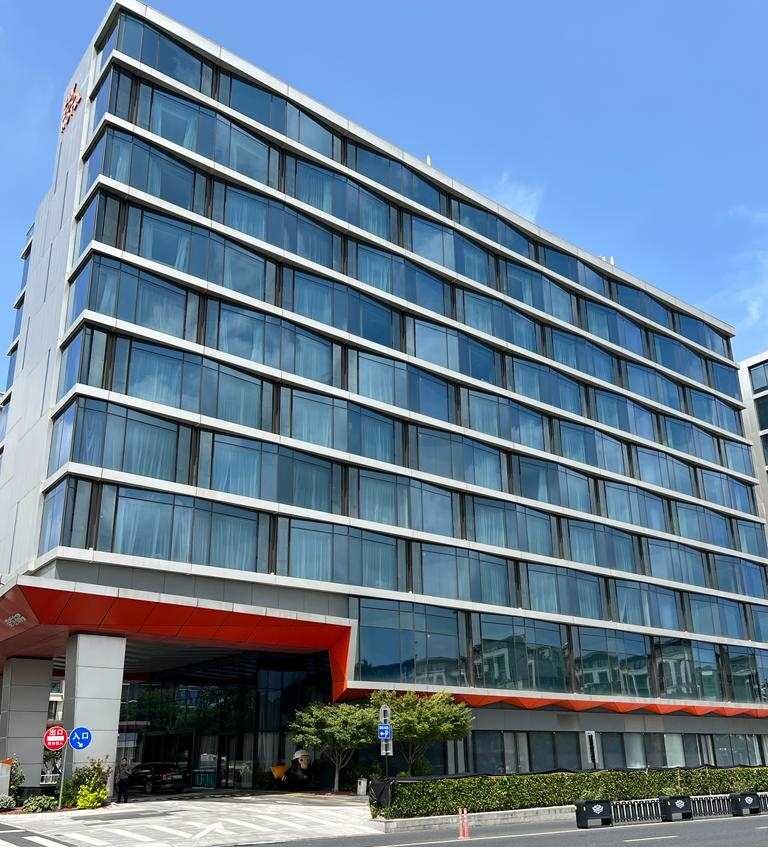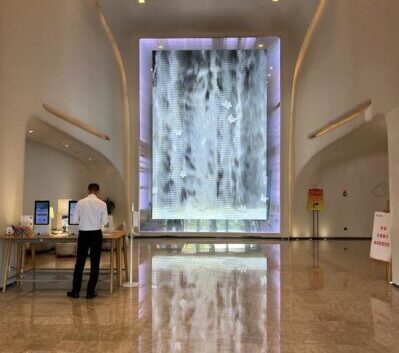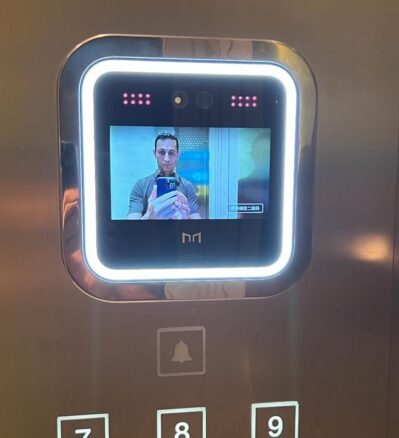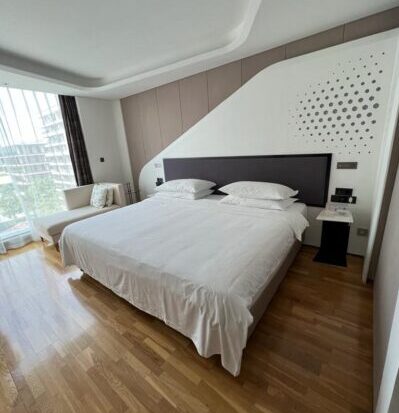

A well-known Brazilian agent told me about the futuristic Flyzoo Hotel soon after it opened in 2019. As it turned out, I was unable to visit this 290 Room 4-star hotel packed with the latest hotel technology until a month ago, after Covid had passed. I had ventured to Hangzhou, the hometown of Jack Ma, the business genius who in the late nineties launched Alibaba, now a golgothan Chinese B2B company that helps many importers around the world connect with exporting Chinese factories. For most people that would be achievement enough, but this legendary titan went on to found Taobao and Tmall, the Chinese equivalent of Amazon, and as part of that developed Alipay, one of China’s two national payment systems, from which he then ventured into the financial and credit services in the form of Ant Financial and then into cloud services. The Flyzoo Hotel, developed by his e-commerce company, Alibaba, and located within its business campus on the outskirts of Hangzhou, incorporates the latest in digital technology. Given his track record in disrupting industries, this was surely worth a visit.
Before I describe the Flyzoo Hotel, let’s first put it into its proper context. As a leading luxury tour company, Imperial Tours typically accommodates its guests at the finest hotels in China, themselves often amongst the finest in the world. Typically, these are full-service hotels with multiple restaurants and bars, less than 200 rooms and a high staff to guest ratio. Given that most leading properties in China are relatively new and spacious, what distinguishes the crème de la crème is the quality of their highly personalized service, and you can’t get great service without amazing staff, fabulous IT, efficient management and subsequently high room rates. This is not the basis on which the Flyzoo Hotel should be judged. This property by contrast seeks to excel in functionality rather than in service. It aims to feed and accommodate its guests in comfortable 4-star circumstances efficiently. That is its purpose and how it should be judged – against a Holiday Inn rather than the Four Seasons.

Chinese domestic travelers begin to interact with the Flyzoo Hotel by booking a room on the Alibaba travel app, Fliggy. This allows them to specify both the floor and view in the chosen room category for their stay. They subsequently use this app again to check in to the hotel on their day of arrival – scanning their ID Card and taking a digital photograph of their faces. This image will be incorporated into the hotel database’s facial recognition software. As a result, when they enter the hotel elevator, their floor will automatically be selected. Their room door lock is equipped with the same software. A camera mounted on the door recognizes and admits them to the room automatically. Sadly, foreigners cannot use the app in the same way yet; overseas visitors must scan their passports and take a facial photo at a booth in the lobby as part of their check-in process. Although there is a bell boy in the lobby to help with bags and also a Front Desk manager loitering in the background, these don’t really have much to contribute in the check in process.
The most useful service-provider in the hotel lobby is in fact a mobile robotic concierge. As this pleasant-looking and sounding Chinese-speaking appliance glides its way towards you, a list of informational menu options lights up on its welcoming screen to be selected. Amongst other options, you can ask it to introduce you to the hotel, for directions to the restaurant, or to explain the check-out procedures.
Exhausted by my exertions with the robotic dancing queen, I made my way to the room. As you can see in these images, this is comfortably, efficiently and functionally furnished in keeping with expectations for a four-star property. Though there are mounted wall switches to control the lights, temperature and curtains, each room is equipped with a Chinese-speaking virtual assistant, the equivalent of Apple’s Siri or Amazon’s Alexa. This can be commanded in Chinese to adjust the room environment along with the TV set and music system. Additionally, if you require anything delivered to the room, from a bottle of water to a particular type of pillow or a room menu item, the virtual assistant will organize for a robot to supply this.

Humans and robots work in tandem in the dining areas. Chefs labor in the dining room’s western and Chinese cooking stations. Meanwhile, QR codes on the table tops direct diners to online restaurant menus and meal ordering programs. Shortly after inputting a table order, dishes are delivered by robots to the table. Diners have to be prompt in removing the food from the drawer at the top of the robot.
Where humans are most in evidence both in the bedrooms and in the dining rooms is in cleaning things away. Neither housekeepers’ nor busboys’ functions have yet been automated. It is an ironic comment on the future of hotel employment that the positions with the lowest paying salaries seem to be safest from being automated.
Whilst the claim will be made that a highly automated hotel makes for a soulless experience, travelers who travel at the 3 and 4 star level are value rather than service-driven. I am not expecting a remarkable service experience when I book an overnight stay at the Holiday Inn, for example. My exchanges with staff will be prompt, utilitarian and efficient. A booking in this segment focuses on value as comprised of a number of factors including price, cleanliness, comfort and convenience. The labor savings that the application of inexpensive technology and robots can provide definitely confer competitive advantage, and the Flyzoo hotel rooms seem like a great deal for the price. While some technologies such as facial recognition software and virtual assistants are bound to be incorporated into the finest hotels, I am not expecting a robotic concierge, even an all-dancing one, to replace the Peninsula concierge or the St. Regis butler anytime soon.